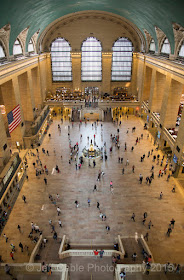We started our tour walking around the main floor of the terminal. (Many people call this Grand Central Station, but it is actually not a station. Since all trains terminate their routes at this building, it is a terminal.) We went into one of the side rooms and I loved the lights and used my Canon 5D Mark III with the Canon 24-105mm lens (used for all images in this post) to shoot this repeating pattern high above us.
I learned that this room was once the main waiting area for passengers about to make long trips across the country. If you look closely at the floor, you can see where passengers wore down the stone by shuffling their feet (nervously waiting for their long trips).
Did you know that almost all the detail work in the building involves acorns and leaves? This is in tribute to the Vanderbilt family, who financed much of the construction of the original terminal.
After walking around for half an hour we were taken up an elevator to view Grand Central from high above the activity. If you look across the terminal, you will see the 3 large windows directly across from us. You will see the 9 different walkway levels. We were on the top level, shooting through small windows, which conveniently opened to give us a clear photo.
Dan took this photo of me shooting through that window. You will notice a couple of things. The floor is made of glass, so that more sunlight would enter the building. You will also notice that I am using my handy Gitzo GT2540 travel tripod. This allowed me to set a low ISO and slow shutter speed to get the following photo.
I photographed in landscape and portrait modes. Here you can see two photos that are similar, with the first shot taken with a slow shutter speed, which shows the movement of the people. This is really important in a place like Grand Central. With so many people hurrying to catch their trains, it is good to capture this action.
This shot was taken with a much faster shutter speed, and even wider than the previous photo.
I took this wider photo to include the heating pipes and windows. This helps show you the environment up at the top of this viewing area.
Here is a another slow shutter shot from high above the terminal. I focused the Canon 5D Mark III on the face of the clock (which is made with large pieces of opal and supposedly worth $20 million). I set the shutter speed to 1 second and relied on some people moving and some people standing still to get the combination of movement, and lack thereof, that you see here. And, by the way, did you know that there is a staircase inside this information booth where workers can go to a similar information booth on the lower level? There is!
And here are a couple of other little known facts about Grand Central Terminal:
There are three interesting facts about the ceiling that most people do not know. First of all, the constellation was actually painted on the ceiling backwards. And, at one point the terminal was going to be torn down. The entire inside of the building, ceiling included, was black. This was caused by the many years of people smoking in the building. Lastly, there is this little hole in the ceiling (which you can see with the black rim about two tiles above the fish.) This hole was put in the ceiling by NASA. Yes, you are hearing this right. They wanted to put a rocket in GCT to promote the space program and measured wrong. They needed to cut a hole in the ceiling to get the rocket to fit.
 |
| Photo I found on the Internet - Credit to Associated Press |
_________________________________________________________________________________
If you are interested in purchasing any camera equipment, please click here to go to B&H Photo, as I get a referral from them if you enter this way. I would really appreciate that.
_________________________________________________________________________________
And also, remember that you and your friends can enter your email address at the top right of this blog to get an email any time I write a new blog post.
_________________________________________________________________________________















Hey Jeff, From what I've read the rocket fit. The hole was used to run a wire to the top of the rocked to stabilize it. I'm skeptical about the shuffling feet theory. I noticed the blocks/tiles are a different shape where the indentations are and if it were people waiting in line the depressions would extend for the full line, not be evenly spaced. I'm going to see if I can find another story about them. But whether the stories you repeated are true or not they are still cool and thanks for sharing.
ReplyDeleteOK Jeff, It's Daniel again. I'm a little slow at times. The feet shuffling was obviously where benches once were placed, not people standing in line. Well obviously now that I've figured it out. I sometimes drive myself nuts until I can figure out stuff like that. Thanks again for the post.
ReplyDeleteOk
DeleteNICE POST.
ReplyDelete